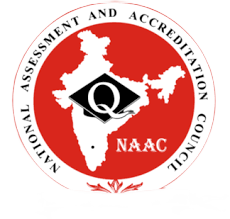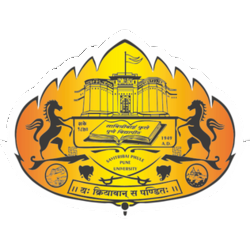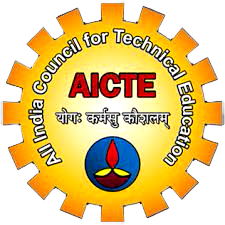Programme Outcomes (POs):
PO1: Engineering Knowledge: Apply the knowledge of mathematics, science, engineering fundamentals, and engineering specialization to the solution of complex engineering problems.
PO2: Problem analysis: identify, formulate, review research literature, and analyze complex engineering problem reaching substantiated conclusions using first principle of mathematics, natural science and engineering science
PO3: Design/ Development of solutions: Design solution for complex engineering problems and design system component or process that meet the specified needs with appropriate consideration for the public health and safety, and cultural, social and environmental consideration.
PO4: Conduct Investigation of complex problems: use research – based knowledge and research method including design of experiments, analyze and interpretation of data, and synthesis of information to provide valid conclusion.
PO5: Modern tool usage: Create, select, and apply appropriate technique, research, and modern engineering and IT tools including prediction and modeling complex engineering activities with an understanding of the limitation.
PO6: The Engineer and Society: Apply reasoning inform by the contextual knowledge to asses societal health, safety, legal and cultural issues and the consequent responsibilities relevant to the professional engineering practice
PO7: Environment and sustainability: understand the impact of professional engineering solutions in societal and environmental contexts, and demonstrate the knowledge of , and need for sustainable development.
PO8: Ethics: Apply ethical principle and commit to professional ethics and responsibilities and norms of the engineering practice
PO9: Individual and team work: function effectively as an individual, and as a member or leader in diverse teams, and in multidisciplinary setting
PO10:Communication: communicate effectively on complex engineering activities with the engineering community and with society at large, such as being able to comprehend and write effective reports and design documentation, make effective presentation, and give the receive clear instruction.
PO11: Project management and finance: Demonstrate knowledge and understand of the engineering and management principle and apply this to one’s work, as a member and leader in a team to mange projects and in multidisciplinary environments.
PO12: Life-long learning: Recognize the need for, and have the preparation and ability to engage in independent and lifelong learning in the broadest context of technological change.
Program Educational Objectives:
PEO1: To prepare under graduate students to excel in technical profession/ industry and/or higher education by providing a strong foundation in mathematics, science and engineering.
PEO2: To transform engineering students to expert engineers so that they could comprehend, analyse, design and create novel products and solutions to Electrical Engineering problems that are technically sound, economically feasible and socially acceptable.
PEO3: To train students to exhibit professionalism, keep up ethics in their profession and relate engineering issues to address the technical and social challenges.
PEO4: To develop communication skills and team work and to nurture multidisciplinary approach in problem solving.
Program specific outcomes (PSOs):
PSO 1: Electrical Engineering Skills: Ability to design, analyze and solve problems in the field of Electrical & Electronics Engineering by applying knowledge acquired from Electrical Power Systems, Electrical Machines, Control Systems, Power Electronics and Field theory.
PSO 2: Interdisciplinary Knowledge: To train students with good scientific and engineering breadth fundamentals required to solve electrical engineering problems.
PSO 3: Professional Development: To excel in current technologies, important to electrical engineering, as well as probable future technological advances & contribute actively to the field by participating in professional societies, attending technical events, doing research, pursuing higher education.
PSO 4: Leadership Skills: To develop ethical attitude, communication skills, teamwork skills, entrepreneurial thinking and an ability to relate engineering attitude to societal issues.
Course Outcome
SEM-I
|
SEM |
Subject |
Sub Code |
Course Outcome |
Course Outcome |
|
SEM I |
Engineering Mathematics-III |
207006 |
CO1 |
Solve higher order linear differential equation using appropriate techniques to model and analyze electrical circuits |
|
CO2 |
Apply Integral transforms such as Laplace transform, Fourier transform and Z-Transform to solve problems related to signal processing and control systems |
|||
|
CO3 |
Apply Statistical methods like correlation, regression and Probability theory as applicable to analyze and interpret experimental data related to energy management, power systems, testing and quality control. |
|||
|
CO4 |
Perform Vector differentiation and integration, analyze the vector fields and apply to wave theory and electro-magnetic fields |
|||
|
CO5 |
Analyze Complex functions, conformal mappings, and perform contour integration in the study of electrostatics, signal and image processing |
|||
|
SEM I |
Power Generation Technologies |
203141 |
CO1 |
Identify components and elaborate working principle of conventional power plants. |
|
CO2 |
Recognize the importance and opportunities of renewable energies. |
|||
|
CO3 |
Calculate and control power output of wind solar, and hydro power plant |
|||
|
CO4 |
Describe process of grid interconnection of distributed generation and requirements. |
|||
|
CO5 |
Interpret the environmental and social impact of various generation technologies |
|||
|
SEM I |
Material Science |
203142 |
CO1 |
Discuss classification,properties and characteristics of different electrical engineering materials. |
|
CO2 |
State various applicationsmeasuring methods for parameters of different classes of electrical engineering materials. |
|||
|
CO3 |
Solve simple problems based on dielectric, magnetic and conducting materials |
|||
|
CO4 |
Apply knowledge of Nano-technology to electrical engineering. |
|||
|
CO5 |
Execute tests ondielectric, insulating, magnetic, conducting, resistive materials as per IS to decide the quality of thematerials |
|||
|
CO6 |
Create learning resource material ethically to demonstrate self learning leading to lifelong learning skills and usage of ICT/ online technology through collaborative/active learning activities. |
|||
|
SEM I |
Analog and Digital Electronics |
203143 |
CO1 |
Design logical, sequential and combinational digital circuit using K-Map. |
|
CO2 |
Demonstrate different digital memories and programmable logic families |
|||
|
CO3 |
Apply and analyze applications of OPAMP in open and closed loop condition. |
|||
|
CO4 |
Design uncontrolled rectifier with given specifications |
|||
|
SEM I |
Electrical Measurements and Instrumentation |
203144 |
CO1 |
Define various characteristic and classify measuring instruments along with range extension techniques |
|
CO2 |
Apply measurement techniques for measurement of resistance, inductance and capacitance |
|||
|
CO3 |
Demonstrate construction, working principle of electrodynamo type and induction type instruments for measurement of power and energy |
|||
|
CO4 |
Make use of CRO for measurement of voltage, current and frequency |
|||
|
CO5 |
Classify transducer and apply it for measurement of physical parameters in real time. |
|||
|
SEM I |
Applications of Mathematics in Electrical Engineering |
203150 |
CO1 |
Apply fundamentals of mathematics in solving electrical engineering problem |
|
CO2 |
Analyze complex electrical engineering problem using mathematical techniques. |
|||
|
CO3 |
Implement program and simulation for problems in electrical engineering. |
|||
|
CO4 |
Demonstrate self lifelong learning skills with applications of mathematics in electrical engineering through software |
|||
|
SEM I |
Soft Skill |
203151 |
CO1 |
DoSWOC analysis |
|
CO2 |
Develop presentation and take part in group discussion |
|||
|
CO3 |
Understand and implement etiquette in workplace and in society at large |
|||
|
CO4 |
Work in team with team spirit |
|||
|
CO5 |
Utilize the techniques for time management and stress management |
|||
|
SEM I |
Solar Thermal System : Audit Course-III |
203152 (A) |
CO1 |
Differentiate between types of solar Concentrators |
|
CO2 |
Apply software tool for solar concentrators |
|||
|
CO3 |
Design different types of Solar collectors and balance of plant |
|||
|
SEM II |
Power System-I |
203145 |
CO1 |
Recognize different patterns of load curve and calculate associated different factors with it and tariff. |
|
CO2 |
Draft specifications of electrical equipment in power station |
|||
|
CO3 |
Design electrical and mechanical aspects in overhead transmission and underground cables |
|||
|
CO4 |
Evaluate the inductance and capacitance of different transmission line configurations. |
|||
|
CO5 |
Analyse the performance of short and medium transmission lines |
|||
|
SEM II |
Electrical Machines-I |
203146 |
CO1 |
Evaluate performance parameters of transformer with experimentation and demonstrate construction along with specifications as per standards. |
|
CO2 |
Distinguish between various types of transformer connections as per vector groups with application and to perform parallel operation of single/three phase transformers |
|||
|
CO3 |
Select and draft specifications of DC machines and Induction motors for various applications along with speed control methods. |
|||
|
CO4 |
Justify the need of starters in electrical machines with merits and demerits. |
|||
|
CO5 |
Test and evaluate performance of DC machines and Induction motors as per IS standard. |
|||
|
SEM II |
Network Analysis |
203147 |
CO1 |
Calculate current/voltage in electrical circuits using simplification techniques, Mesh, Nodal analysis and network theorems |
|
CO2 |
Analyze the response of RLC circuit with electrical supply in transient and stead state |
|||
|
CO3 |
Apply Laplace transform to analyze behaviour of an electrical circuit. |
|||
|
CO4 |
Derive formula and solve numerical of two port network and Design of filters |
|||
|
CO5 |
Applyknowledge of network theory to find transfer function, poles and zeroes location to perform stability analysis and parallel resonance |
|||
|
SEM II |
Numerical Methods and Computer Programming |
203148 |
CO1 |
Demonstrate types of errors in computation and their causes of occurrence. |
|
CO2 |
Calculate root of algebraic and transcendental equations using various methods. |
|||
|
CO3 |
Apply numerical methods for various mathematical problems such as interpolation, numerical differentiation, integration and ordinary differential equation |
|||
|
CO4 |
Solve linear simultaneous equation using direct and indirect method. |
|||
|
CO5 |
Develop algorithms and write computer programs for various numerical methods. |
|||
|
SEM II |
Fundamental of Microcontroller and Applications |
203149 |
CO1 |
Describe the architecture and features of various types of the microcontroller |
|
CO2 |
Illustrate addressing modes and execute programs in assembly language for the microcontroller |
|||
|
CO3 |
Write programs in C language for microcontroller 8051 |
|||
|
CO4 |
Elaborate interrupt structure of 8051 and program to handle interrupt and ADC809 |
|||
|
CO5 |
Define the protocol for serial communication and understand the microcontroller development systems |
|||
|
CO6 |
Interface input output devices and measure electrical parameters with 8051 in real time. |
|||
|
SEM II |
Project Based Learning |
203152 |
CO1 |
Identify, formulate, and analyze the simple project problem. |
|
CO2 |
Apply knowledge of mathematics, basic sciences, and electrical engineering fundamentals to develop solutions for the project. |
|||
|
CO3 |
Learn to work in teams, and to plan and carry out different tasks that are required during a project. |
|||
|
CO4 |
Understand their own and their team-mate's strengths and skills. |
|||
|
CO5 |
Draw information from a variety of sources and be able to filter and summarize the relevant points. |
|||
|
CO6 |
Communicate to different audiences in oral, visual, and written forms. |
|||
|
SEM II |
Solar Photovoltaic Systems |
203153(A) |
CO1 |
design of Solar PV system for small and large installations |
|
Audit Course-IV |
CO2 |
handle software tools for Solar PV systems |


